-
€
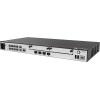
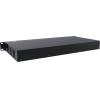

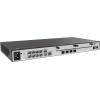
The Huawei NetEngine AR730 is a high-performance router equipped with a quad-core ARM processor. It has a packet forwarding rate of 9-25 Mp/s and a throughput of 6 Gbps. The device features a total of 3 WAN ports - 2x Combo (Gigabit Ethernet / SFP) and 1x SFP+ (10 Gbps), as well as 9 ports that can operate as either WAN or LAN: 1x Combo (Gigabit Ethernet / SFP) and 8x Gigabit Ethernet. The AR730 stands out for its performance and stability, with advanced software that enables early detection of various errors, ensuring continuous operation. It supports the WLAN Access Control (WAC) function and can function as an access point controller in both eKitEngine and AirEngine networks. The router provides high network security with a built-in firewall, IPS, URL filtering, and various VPN technologies. It is designed for mounting in a 19" rack, has a built-in AC power supply, and a maximum power consumption of 33 W. The device employs active cooling with airflow direction from left to right.
1 SFP+ slot, 3 Combo ports (GE / SFP), 8 gigabit Ethernet ports
The device is equipped with 2 Combo ports (Gigabit Ethernet / SFP) and 1 SFP+ port (10 Gbps) for WAN connectivity. The remaining 8 gigabit Ethernet ports (10/100/1000 Mbps) and 1 Combo port (GE/SFP) are configured as LAN by default, with the option to switch them to WAN. Additionally, there are extra management ports: 1 RJ45 console port and 2 USB ports.
The router features a built-in AC power supply, with a maximum power consumption of only 33W. It utilizes integrated active cooling with airflow from left to right.


High performance
The AR730 features a high-performance quad-core ARM processor and 4GB of RAM. It supports a throughput of 6 Gbps, with a packet forwarding rate ranging from 9 to 25 Mp/s. The device provides excellent performance, especially when compared to competing solutions. It supports load balancing, allowing you to utilize signals from multiple internet service providers. Technologies such as Multi-fed and selective receiving are employed to optimize WAN connections, minimizing packet loss and delays.
A controller, switch, and router all in one, with 2 SIC slots
The offered product combines the functionality of a high-performance router, switch, and Wireless Access Controller (WAC). It supports advanced IPv4 and IPv6 routing features, including RIP / RIPng, OSPF / OSPFv3, IS-IS / IS-ISv6, and BGP / BGP4+. It can manage access points and supports the CAPWAP protocol. The AR730 utilizes a non-blocking architecture, allowing you to fully utilize the port throughput when operating as a switch without concerns about any component of the device becoming a bottleneck.
Additionally, the router features 2 SIC slots where you can use compatible cards. These are hot-swap ports, allowing you to replace them at any time during operation. You can use cards with additional WAN, LAN, or LTE interfaces in these slots.
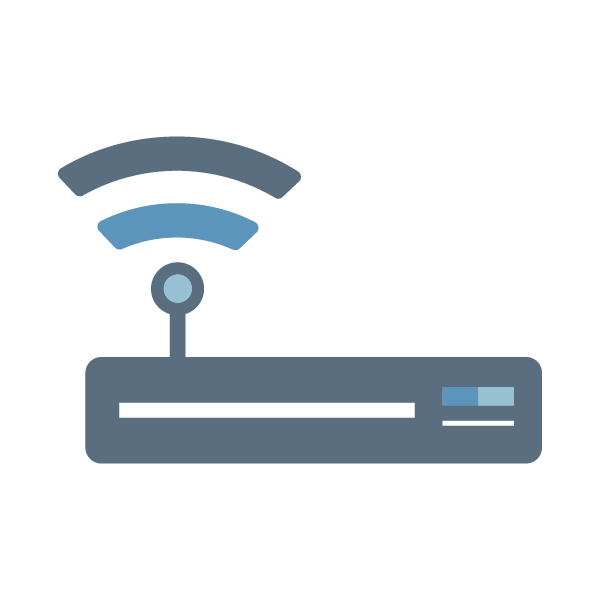
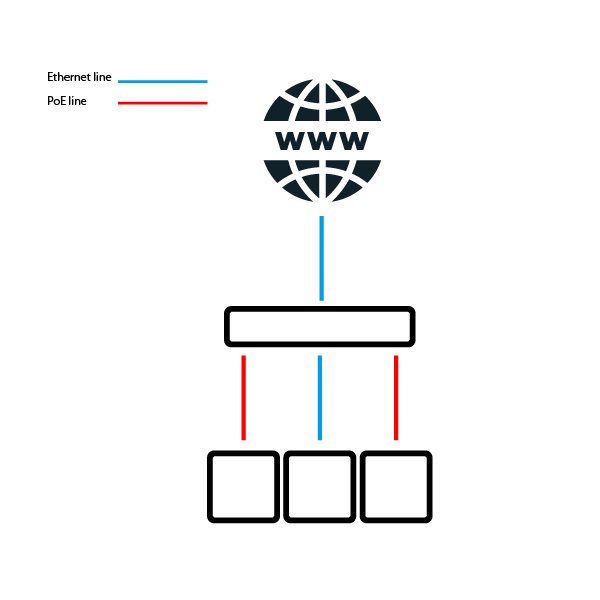
Advanced security
The Huawei AR730 stands out with advanced security features, making it ideal for networks where high data security is required. The device includes a built-in firewall, supports IPS, and URL filtering. Your network is protected against various types of potential attacks.
You can utilize 802.1X, MAC address authentication, or portal-based authorization for user authentication. The AR720 supports multiple VPN standards: IPSec VPN, GRE VPN, DSVPN, A2A VPN, L2TP VPN, and L2TPv3 VPN. This is crucial for networks where external access is required, such as for mobile employees.
Usage
The offered product is well-suited for large corporate networks where high performance and top-level security are essential. The AR730 can also be used in very large distributed networks, where it will serve as the main device at one of the locations (known as sites).
If you're planning a network in a location with multiple access points and designed to handle numerous users simultaneously, then the AR730 is the solution you need.

Specifications
| Huawei NetEngine AR730 | |
| Processor | ARM64 4 rdzenie |
| Forwarding performance | 9 - 25 Mp/s |
| Number of connected terminals | 1200 |
| Outbound bandwidth | 6 Gb/s |
| Fixed WAN ports |
2x Combo (Gigabit Ethernet / SFP) 1x SFP+ (10 Gb/s) comaptbile with SFP |
| Fixed LAN ports |
1x Combo (Gigabit Ethernet / SFP) 8x GE electrical ports (can be switched to WAN ports) |
| SIC slots | 2 |
| WSIC slot (default/maximum) | 0/1 |
| Serial auxiliary or console port | 1x RJ45 console serial port |
| USB ports | 2x USB |
| Memory | 4 GB |
| Flash | 1 GB |
| Hot swapping |
Supported |
| Dimensions excluding the parts protruding from the body (H x W x D) | 44.4 mm x 442.0 mm x 220.4 mm |
| Dimensions with the parts protruding from the body (H x W x D) |
44.4 mm x 442.0 mm x 225.2 mm |
| Dimensions of the packing box (H x W x D) | 90 mm x 570 mm x 390 mm |
| Weight (unconfigured) | 3,2 kg |
| Rack | IEC |
| Required space in a rack | 1U |
| Rated input voltage (AC) | 100 - 240 V AC |
| Rated input frequency (AC) | 50 / 60 Hz |
| Maximum input voltage (AC) | 90 - 264 V AC |
| Maximum input current (AC) | 2 A |
| Maximum output power (AC) | 70 W |
| Maximum power consumption | 33 W |
| Fan module | Built-in unpluggable fan module |
| Airflow | Left to right |
| Noise | 52,3 dB |
| Operating temperature | 0°C to 45°C |
| Operating humidity | 5% to 95% (non-condensing) |
| Storage temperature | –40°C to +70°C |
| Software features | |
|---|---|
| Basic functions |
DHCP server/client/relay PPPoE server/client NAT, and sub-interface management |
| LAN | IEEE 802.1p, IEEE 802.1Q, IEEE 802.3, VLAN management, VLAN aggregation, MAC address management, STP, etc. |
| WLAN (AC) |
AP management (AC discovery, AP access, and AP management) CAPWAP protocol WLAN user management WLAN radio management (802.11a/b/g/n/ac) WLAN QoS (WMM) and WLAN security (WEP/WPA/WPA2/key management) |
| IPv4 unicast routing | Routing policy, static route, RIP, OSPF, IS-IS, and BGP |
| IPv6 unicast routing | Static route, routing policy, RIPng, OSPFv3, IS-ISv6, and BGP4+ |
| Basic IPv6 functions | IPv6 ND, IPv6 PMTU, IPv6 FIB, IPv6 ACL, ICMPv6, DNSv6, and DHCPv6 |
| IPv6 tunneling | Manual tunnel, automatic tunnel, GRE tunnel, 6over4 tunnel, 6to4 tunnel, and ISATAP |
| Multicast | IGMPv1, IGMPv2, IGMPv3, PIM SM, PIM DM, MSDP, MBGP, IPv6 PIM, and MLD |
| MPLS | LDP, MPLS L3 VPN, VLL, PWE3, static LSP, dynamic LSP, MPLS TE, IP FRR, LDP FRR, and TE FRR |
| VPN | IPSec VPN, GRE VPN, DSVPN, A2A VPN, L2TP VPN, and L2TPv3 VPN |
| QoS |
DiffServ mode MPLS QoS Priority mapping Traffic policing (CAR) Traffic shaping Congestion avoidance HQoS MQC (traffic classifier, traffic behavior, and traffic policy) Hhierarchical QoS Smart application control (SAC) |
| WAN optimization | Multi-fed and selective receiving, per-packet load balancing |
| Security |
ACLv4/v6 Domain-based stateful firewall 802.1X authentication MAC address authentication Portal authentication AAA RADIUS HWTACACS PKI Broadcast storm suppression ARP security ICMP attack defense URPF CPCAR Blacklist Attack source tracing Online behavior management IPS URL filtering |
| Management and maintenance |
Upgrade management Device management Web system GTL SNMP (v1/v2c/v3) RMON NTP CWMP, Email/USB/DHCP-based deployment NETCONF/YANG CLI NetStream TWAMP IP FPM TCP FPM IP accounting NQA |






 Polski
Polski English
English Italiano
Italiano Español
Español Čeština
Čeština Српски
Српски Deutsch
Deutsch Ελληνικά
Ελληνικά Slovenský
Slovenský




